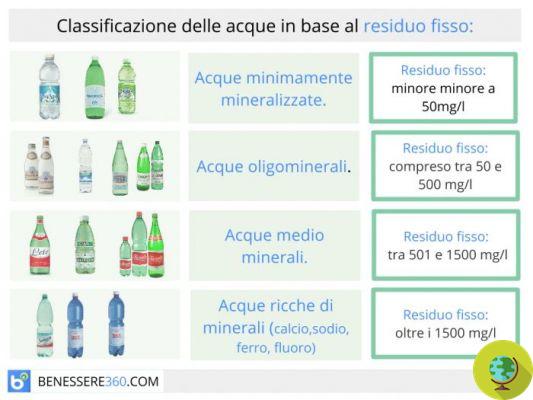
Waterfall. Indispensable source of our well-being. We should remember to drink often throughout the day, preferably between meals
Do not store avocado like this: it is dangerous.water is a fundamental resource for our body which we often forget about. In fact, there are many people who need to always keep a bottle of water nearby to remember to drink, otherwise the stimulus of thirst is not felt. But do we really know how much water is good to drink, what type and at what times of the day? It is generally recommended to drink at least one and a half liters, 2 liters of water per day (about 8 glasses) indiscriminately depending on the people and situations. In reality this data, albeit correct, it should be a little better calibrated as appropriate. There are categories, for example sportsmen, who need a greater amount of water because they lose a lot of it during their workouts or certain pathologies that may arise, such as cystitis, which require a greater consumption of water than the classic liter and a half - two. But even simply in the summer when more liquids are lost, it would be better to increase the amount of water by integrating with lots of fruit and vegetables. Another fundamental point is that the water should be, more often than not, a low fixed residue. By fixed residue we mean the quantity of minerals that are dissolved inside and is calculated by bringing the water to a temperature of 180 °. They stand out like this 4 types of water: 1. Minimally mineralized: less than 50 mg / l 2. Oligomineral: less than 500 mg / l; 3. Medium Mineral: between 500 and 1000 mg / l. 4. Rich in mineral salts: more than 1500 mg / l. I minerals if they are present in large quantities, in the long run they tend to settle in the body who may begin to have difficulty disposing of them properly. However, this is not true in all cases, again in the case of sportsmen it could be useful to drink well mineralized water in order to at least partially replenish what was lost with training. The same goes for the elderly who may need to take richer water as they may be deficient in mineral salts. On the contrary, if you want to purify the body in the best possible way and to combat water retention it is important that the water has a low fixed residue in order to allow greater detoxification. This type of water is also suitable for feeding very young children and is generally recommended for everyone: in most cases, therefore, the lighter the water, the more suitable it is for the well-being of our organism. As we have seen, however, there are exceptions, therefore to each his own water! The ideal if you are in a particular condition of your life or suffer from some pathology is ask your doctor what is the best water for your needs. But when to drink it? There are no particular limits in drinking water during the day, the only caution is that of do not overdo it during meals or worse still, limit your fluid intake only to those moments. It has in fact been seen that drinking water while eating contributes to diluting gastric juices useful for digestion, with the effect of slowing it down and also partially reducing the absorption of some nutrients. Better then drink as much as possible between meals since in this way diuresis is favored and therefore the detoxification process of our body as well as intestinal peristalsis and therefore intestinal well-being. You just have to go immediately and get a nice glass of water!
Read also: 10 reasons to drink 2 liters of water a day Water and lemon: 10 health benefits Water and lemon: 10 health benefits


























